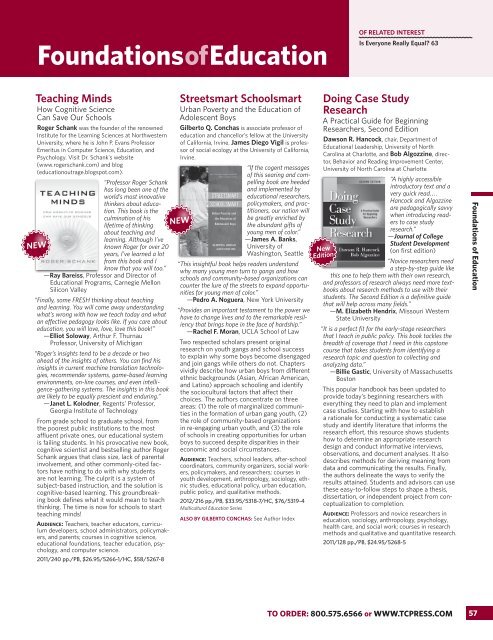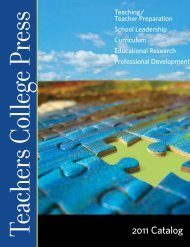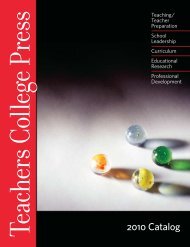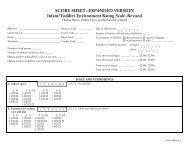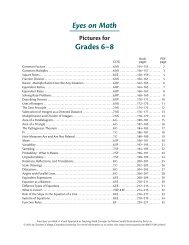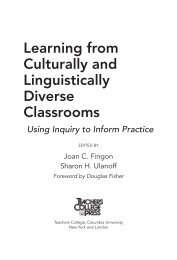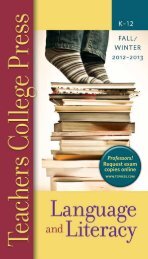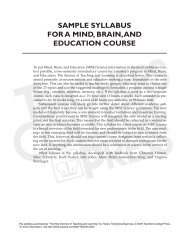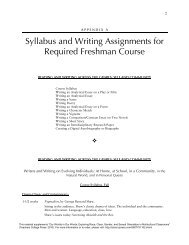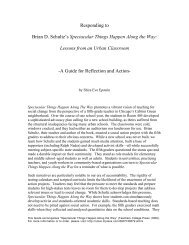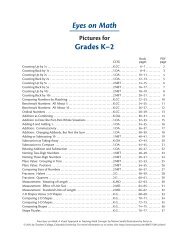estsellers - Teachers College Press
estsellers - Teachers College Press
estsellers - Teachers College Press
You also want an ePaper? Increase the reach of your titles
YUMPU automatically turns print PDFs into web optimized ePapers that Google loves.
FoundationsofEducation<br />
of Related Interest<br />
Is Everyone Really Equal 63<br />
Teaching Minds<br />
How Cognitive Science<br />
Can Save Our Schools<br />
Roger Schank was the founder of the renowned<br />
Institute for the Learning Sciences at Northwestern<br />
University, where he is John P. Evans Professor<br />
Emeritus in Computer Science, Education, and<br />
Psychology. Visit Dr. Schank’s website<br />
(www.rogerschank.com) and blog<br />
(educationoutrage.blogspot.com).<br />
New<br />
Edition<br />
NEW<br />
Best<br />
Seller<br />
“Professor Roger Schank<br />
has long been one of the<br />
world’s most innovative<br />
thinkers about education.<br />
This book is the<br />
culmination of his<br />
lifetime of thinking<br />
about teaching and<br />
learning. Although I’ve<br />
known Roger for over 20<br />
years, I’ve learned a lot<br />
from this book and I<br />
know that you will too.”<br />
—Ray Bareiss, Professor and Director of<br />
Educational Programs, Carnegie Mellon<br />
Silicon Valley<br />
“Finally, some FRESH thinking about teaching<br />
and learning. You will come away understanding<br />
what’s wrong with how we teach today and what<br />
an effective pedagogy looks like. If you care about<br />
education, you will love, love, love this book!”<br />
—Elliot Soloway, Arthur F. Thurnau<br />
Professor, University of Michigan<br />
“Roger’s insights tend to be a decade or two<br />
ahead of the insights of others. You can find his<br />
insights in current machine translation technologies,<br />
recommender systems, game-based learning<br />
environments, on-line courses, and even intelligence-gathering<br />
systems. The insights in this book<br />
are likely to be equally prescient and enduring.”<br />
—Janet L. Kolodner, Regents’ Professor,<br />
Georgia Institute of Technology<br />
From grade school to graduate school, from<br />
the poorest public institutions to the most<br />
affluent private ones, our educational system<br />
is failing students. In his provocative new book,<br />
cognitive scientist and bestselling author Roger<br />
Schank argues that class size, lack of parental<br />
involvement, and other commonly-cited factors<br />
have nothing to do with why students<br />
are not learning. The culprit is a system of<br />
subject-based instruction, and the solution is<br />
cognitive-based learning. This groundbreaking<br />
book defines what it would mean to teach<br />
thinking. The time is now for schools to start<br />
teaching minds!<br />
Audience: <strong>Teachers</strong>, teacher educators, curriculum<br />
developers, school administrators, policymakers,<br />
and parents; courses in cognitive science,<br />
educational foundations, teacher education, psychology,<br />
and computer science.<br />
2011/240 pp./PB, $26.95/5266-1/HC, $58/5267-8<br />
Streetsmart Schoolsmart<br />
Urban Poverty and the Education of<br />
Adolescent Boys<br />
Gilberto Q. Conchas is associate professor of<br />
education and chancellor’s fellow at the University<br />
of California, Irvine. James Diego Vigil is professor<br />
of social ecology at the University of California,<br />
Irvine.<br />
New<br />
Edition<br />
NEW<br />
Best<br />
Seller<br />
“If the cogent messages<br />
of this searing and compelling<br />
book are heeded<br />
and implemented by<br />
educational researchers,<br />
policymakers, and practitioners,<br />
our nation will<br />
be greatly enriched by<br />
the abundant gifts of<br />
young men of color.”<br />
—James A. Banks,<br />
University of<br />
Washington, Seattle<br />
“This insightful book helps readers understand<br />
why many young men turn to gangs and how<br />
schools and community-based organizations can<br />
counter the lure of the streets to expand opportunities<br />
for young men of color.”<br />
—Pedro A. Noguera, New York University<br />
“Provides an important testament to the power we<br />
have to change lives and to the remarkable resiliency<br />
that brings hope in the face of hardship.”<br />
—Rachel F. Moran, UCLA School of Law<br />
Two respected scholars present original<br />
research on youth gangs and school success<br />
to explain why some boys become disengaged<br />
and join gangs while others do not. Chapters<br />
vividly describe how urban boys from different<br />
ethnic backgrounds (Asian, African American,<br />
and Latino) approach schooling and identify<br />
the sociocultural factors that affect their<br />
choices. The authors concentrate on three<br />
areas: (1) the role of marginalized communities<br />
in the formation of urban gang youth, (2)<br />
the role of community-based organizations<br />
in re-engaging urban youth, and (3) the role<br />
of schools in creating opportunities for urban<br />
boys to succeed despite disparities in their<br />
economic and social circumstances.<br />
Audience: <strong>Teachers</strong>, school leaders, after-school<br />
coordinators, community organizers, social workers,<br />
policymakers, and researchers; courses in<br />
youth development, anthropology, sociology, ethnic<br />
studies, educational policy, urban education,<br />
public policy, and qualitative methods.<br />
2012/216 pp./PB, $33.95/5318-7/HC, $76/5319-4<br />
Multicultural Education Series<br />
Also by Gilberto Conchas: See Author Index<br />
Doing Case Study<br />
Research<br />
A Practical Guide for Beginning<br />
Researchers, Second Edition<br />
Dawson R. Hancock, chair, Department of<br />
Educational Leadership, University of North<br />
Carolina at Charlotte, and Bob Algozzine, director,<br />
Behavior and Reading Improvement Center,<br />
University of North Carolina at Charlotte<br />
New<br />
Edition<br />
“A highly accessible<br />
introductory text and a<br />
very quick read....<br />
Hancock and Algozzine<br />
are pedagogically savvy<br />
when introducing readers<br />
to case study<br />
research.”<br />
—Journal of <strong>College</strong><br />
Student Development<br />
(on first edition)<br />
NEW<br />
“Novice researchers need<br />
a step-by-step guide like<br />
this one to help them with their own research,<br />
and professors of research always need more textbooks<br />
about research methods to use with their<br />
students. The Second Edition is a definitive guide<br />
that will help across many fields.”<br />
—M. Elizabeth Hendrix, Missouri Western<br />
State University<br />
“It is a perfect fit for the early-stage researchers<br />
that I teach in public policy. This book tackles the<br />
breadth of coverage that I need in this capstone<br />
course that takes students from identifying a<br />
research topic and question to collecting and<br />
analyzing data.”<br />
—Billie Gastic, University of Massachusetts<br />
Boston<br />
This popular handbook has been updated to<br />
provide today’s beginning researchers with<br />
everything they need to plan and implement<br />
case studies. Starting with how to establish<br />
a rationale for conducting a systematic case<br />
study and identify literature that informs the<br />
research effort, this resource shows students<br />
how to determine an appropriate research<br />
design and conduct informative interviews,<br />
observations, and document analyses. It also<br />
describes methods for deriving meaning from<br />
data and communicating the results. Finally,<br />
the authors delineate the ways to verify the<br />
results attained. Students and advisors can use<br />
these easy-to-follow steps to shape a thesis,<br />
dissertation, or independent project from conceptualization<br />
to completion.<br />
Audience: Professors and novice researchers in<br />
education, sociology, anthropology, psychology,<br />
health care, and social work; courses in research<br />
methods and qualitative and quantitative research.<br />
2011/128 pp./PB, $24.95/5268-5<br />
Best<br />
Seller<br />
57<br />
Foundations of Education<br />
to order: 800.575.6566 or www.tcpress.com<br />
57


